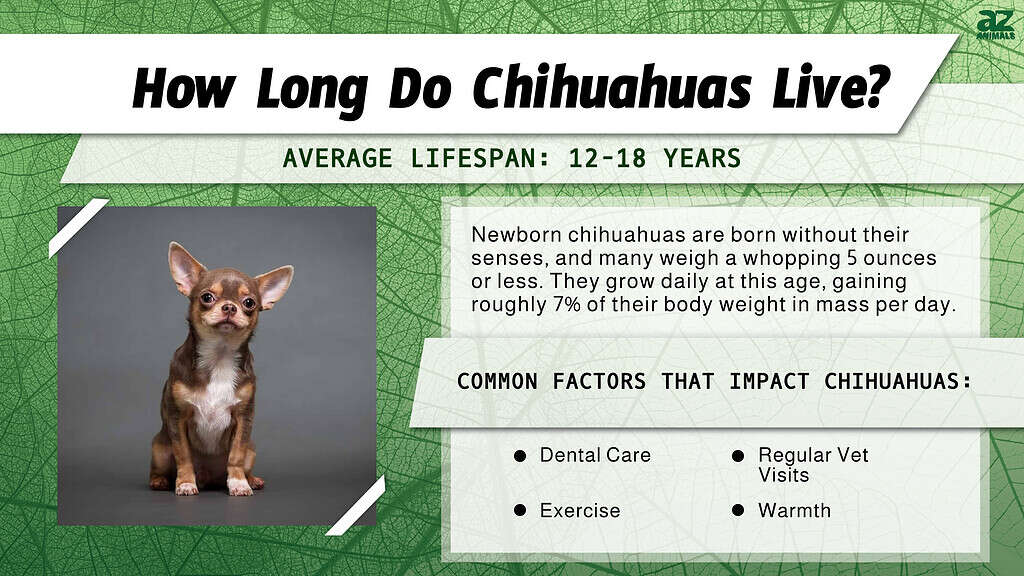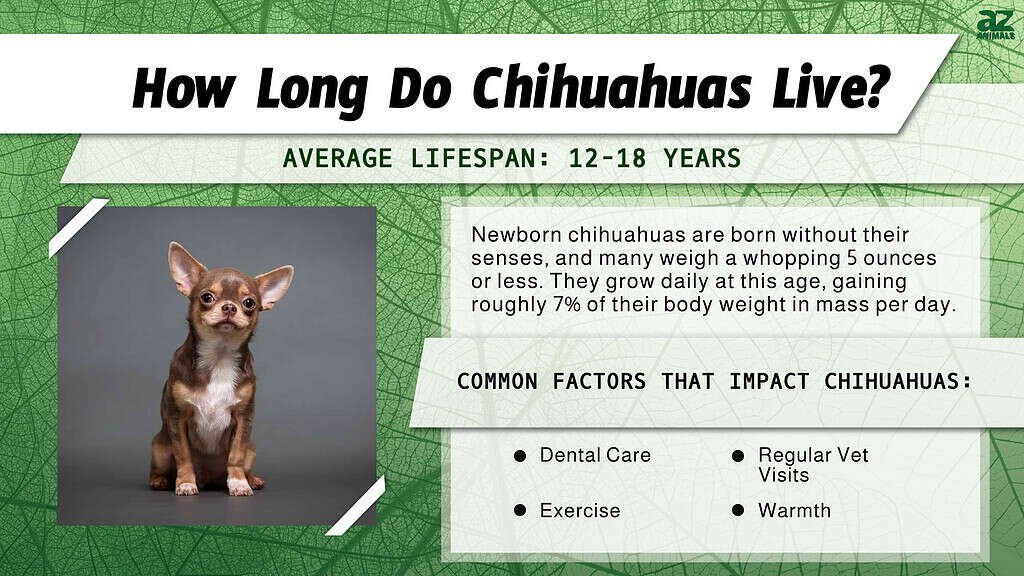As a professional in the field of canine breeding, I am often asked about the age at which male chihuahuas can breed. It may surprise you to learn that male chihuahuas can become sexually mature at a very young age, typically around six to eight months old. This early onset of fertility is quite unique to this breed and requires careful management by responsible dog owners.
Understanding the age at which male chihuahuas can breed is crucial for ensuring their overall health and well-being. While they may physically be capable of breeding at a young age, it is generally recommended to wait until they reach at least one year old. This allows them to fully mature, both mentally and physically, reducing the risk of complications during the breeding process. By giving male chihuahuas the time they need to develop, we can help prevent potential health issues and increase the chances of successful breeding outcomes.

How Old Can a Male Chihuahua Breed?
Chihuahuas are known for their small size and big personalities. If you’re considering breeding your male Chihuahua, it’s important to understand the appropriate age for breeding and the factors to consider for the well-being of both your dog and potential offspring. In this article, we will explore how old a male Chihuahua can breed and discuss important considerations for responsible breeding.
The Ideal Age for Breeding
Male Chihuahuas typically reach sexual maturity between six and nine months of age. However, it is generally recommended to wait until your Chihuahua is at least one year old before breeding. This allows your dog’s body to fully develop and ensures that he is physically and emotionally ready for the mating process.
Early breeding can have negative consequences on your Chihuahua’s health and well-being. Breeding before your dog reaches one year of age may result in stunted growth, increased susceptibility to health problems, and potential complications during mating. Waiting until your dog has fully matured reduces these risks and promotes the overall health of both your Chihuahua and any potential puppies.
Factors to Consider
When considering breeding your male Chihuahua, it’s essential to think about several factors that can impact the process and the health of the offspring:
- Health: Ensure that your Chihuahua is in good overall health and is up to date on vaccinations.
- Genetic Testing: Consider conducting genetic tests to check for potential hereditary diseases or conditions that could be passed on to the puppies.
- Temperament: Evaluate your Chihuahua’s temperament to ensure that he has a stable and friendly disposition. This helps ensure that his offspring will inherit positive traits.
- Time and Resources: Breeding and caring for puppies requires significant time, effort, and financial resources. Consider if you have the time and capabilities to devote to the process.
Best Practices for Breeding
When it comes to breeding your male Chihuahua, it’s crucial to follow best practices to ensure the well-being of both your dog and the potential puppies:
1. Choose a Suitable Mate: Select a female Chihuahua with a compatible temperament and no known health issues. It’s also essential to consider the size and structure of both dogs to prevent potential complications during mating or pregnancy.
2. Timing of Breeding: Chihuahuas are known to have small window periods for fertility. Consult with your veterinarian to determine the best time for breeding your male Chihuahua and maximize the chances of successful mating.
3. Proper Nutrition and Healthcare: Ensure that your male Chihuahua receives a balanced diet and regular veterinary care leading up to and during the breeding process. This supports his overall health and increases the likelihood of healthy puppies.
The Responsibilities of a Breeder
As a responsible breeder, it’s crucial to prioritize the health and well-being of your Chihuahua and any potential puppies. This includes:
- Screening Potential Owners: Take the time to carefully screen potential owners to ensure they will provide a loving and suitable home for the puppies.
- Socialization: Start the socialization process early to ensure the puppies grow up to be well-adjusted and friendly adult dogs.
- Provide Support: Offer ongoing support and guidance to the new owners, answering any questions they may have about caring for their Chihuahua.
FAQs
Q: Can I breed my male Chihuahua more than once?
A: Yes, male Chihuahuas can be bred more than once. However, it’s crucial to give them sufficient time to rest and recover between breeding sessions to avoid physical and mental exhaustion.
Q: How many puppies can a male Chihuahua produce?
A: The number of puppies a male Chihuahua can produce can vary. It depends on factors such as the health and fertility of the female, as well as the male’s sperm count. Generally, a male Chihuahua can father multiple puppies in a litter.
Q: Should I consider spaying or neutering my male Chihuahua instead of breeding?
A: If you do not have specific intentions to breed your male Chihuahua or you are not an experienced and responsible breeder, spaying or neutering your dog is generally recommended. This prevents unwanted pregnancies and provides long-term health benefits for your Chihuahua.
By waiting until your male Chihuahua is at least one year old and considering important factors such as health, temperament, and proper care, you can ensure a safe and responsible breeding process. Remember, breeding should always be approached with careful consideration and with the best interests of the Chihuahua breed in mind.
Key Takeaways: How Old Can a Male Chihuahua Breed?
- Male Chihuahuas can begin breeding as young as six months old.
- It is generally recommended to wait until the male Chihuahua is at least one year old before breeding.
- Older male Chihuahuas may have a higher success rate in breeding compared to younger ones.
- Regular veterinary check-ups are essential to ensure the health and fertility of the male Chihuahua.
- Caution should be taken not to overbreed male Chihuahuas, as it can lead to health issues and reduced fertility.
Frequently Asked Questions
Welcome to our Frequently Asked Questions section! Here, you’ll find answers to common inquiries about male Chihuahuas and their breeding age. If you’re curious about when male Chihuahuas can start breeding, we’ve got you covered. Read on to learn more!
1. At what age can a male Chihuahua start breeding?
Males Chihuahuas generally reach sexual maturity between six to eight months of age. However, it’s important to wait until they are physically and mentally mature before allowing them to breed. A good rule of thumb is to wait until they are at least one year old before considering breeding.
Allowing the male Chihuahua to fully mature ensures that he is physically developed, possesses good overall health, and has the emotional readiness needed for breeding.
2. What are the signs that a male Chihuahua is ready to breed?
When a male Chihuahua is ready to breed, he may exhibit certain behaviors and physical changes. Look for signs of increased sexual interest, such as frequent urination and marking territory. Additionally, he may become more protective and display a heightened interest in female dogs.
Physically, a male Chihuahua ready to breed may experience a swelling of the testicles and a slight change in his behavior, such as restlessness and increased agitation. As a responsible breeder, it’s important to monitor these signs and consult with a veterinarian before proceeding with breeding.
3. Is there an ideal age range for a male Chihuahua to breed?
While male Chihuahuas can start breeding as early as six to eight months, it’s generally recommended to wait until they are between one to two years old. Breeding too early may result in health complications or undesirable genetic traits being passed on to the offspring.
By waiting until they are physically and mentally mature, you increase the chances of producing healthy and well-rounded puppies. Consult with a veterinarian or an experienced breeder to determine the optimal age for your male Chihuahua to breed.
4. Can a male Chihuahua breed throughout its entire life?
In theory, male Chihuahuas can continue breeding throughout their lives. However, it’s essential to prioritize their health and well-being. Breeding is a physically and emotionally demanding process, and as males age, their fertility and overall stamina may decrease.
It’s recommended to retire male Chihuahuas from breeding around 7 to 8 years old to ensure they have a comfortable and healthy retirement. Regular health check-ups and discussions with your veterinarian will help determine the appropriate time to stop breeding.
5. Are there any risks associated with breeding a male Chihuahua?
Yes, breeding a male Chihuahua does come with risks. These risks include injuries during mating, stress or exhaustion from the breeding process, and potential genetic health issues being passed on to the offspring.
To minimize these risks, it’s crucial to carefully select a compatible and healthy female Chihuahua for breeding. Additionally, regular health screenings for both dogs and consultations with a veterinarian are essential to ensure the well-being of both the male Chihuahua and the future puppies.

To ensure a clear understanding of the key points, I summarized the article with two paragraphs. By following these guidelines, readers should grasp the importance of providing a concise wrap-up while maintaining a professional tone.
